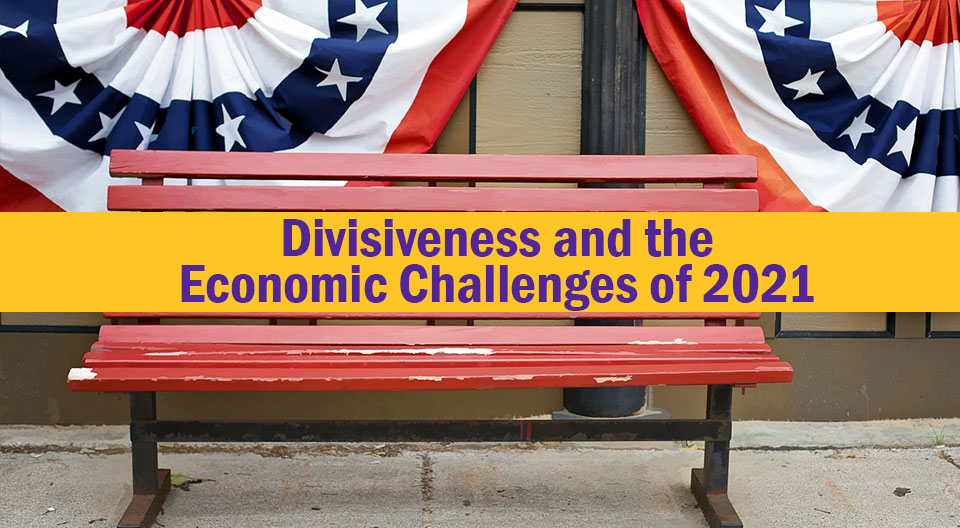
It’s time to continue with our Divisiveness and the Economic Challenges of 2021 series with Challenge #4 – Healthcare.
One positive thing to come out of the COVID-19 pandemic – the demonstration of the commitment, dedication and excellence of U.S. healthcare workers. The technological capabilities and advances in healthcare, combined with the dedication of healthcare workers, are certainly outstanding attributes of the U.S. healthcare system.
However, there are a variety of challenges that exist for the U.S. healthcare system. Once again, there certainly have been divisions – the Affordable Care Act (ACA) and universal health care discussions are primary examples. Costs, access to care and administration of health care are major issues that would hopefully be improved by productive discussions of differences in opinions. Some of the challenges:
- On a per capita basis, the United States spends more on health care than any other country – by far. According to the OECD (Organization for Economic Cooperation and Development), the top 5 countries for health care spending per capita in 2019 were: 1) United States $11,072, 2) Switzerland $7,732, 3) Norway $6,647, 4) Germany $6,646, 5) Austria $5,851. Canada ranked 11th at $5,418 while the United Kingdom ranked 17th at $4,653.
- A March 2019 article in the American Journal of Public Health stated that although the ACA expanded and upgraded health insurance coverage through banning preexisting illness exclusions, imposing a cap on out-of-pocket spending, and mandating coverage for essential benefits, medical costs could still be a significant financial burden, with two-thirds of individual bankruptcies related to medical costs.
- According to a 2020 report by the Kaiser Family Foundation, since 2010 healthcare costs have risen much faster than wages. Average family healthcare premiums (paid by an employer) have increased 55%, workers’ contribution for family healthcare premiums (their portion of premium cost) increased 40%, deductibles increased 111%, wages have increased only 27%.
- A 2019 study by the Kaiser Family Foundation found that approximately half of U.S. adults indicated that they or a family member put off or skipped some sort of health care or dental care or relied on an alternative treatment in the past year because of the cost, and about one in eight said their medical condition got worse as a result. Three in 10 of all adults reported not taking their medicines as prescribed at some point in the past year because of the cost.
- According to a 2018 study by the Peterson Center on Healthcare and the Kaiser Family Foundation, the share of the nonelderly population with employer-sponsored health insurance fell by more than 8 percentage points between 1998 and 2018, from 67% to 58%. Although there was a modest increase in the percentage of job-based coverage between 2013 and 2018 as the economy improved, the increase was not nearly enough to offset the long-term decline. The COVID-19 economic challenges could reverse the recent increase.
- The U.S. News 2020 Best Countries rankings was developed in partnership with BAV Group, a unit of global marketing communications company VMLY&R, and the Wharton School of the University of Pennsylvania. The rankings evaluate 73 countries across 24 rankings drawn from a survey of more than 20,000 global citizens, measuring 75 different metrics. When it comes to health care, the U.S. was ranked 15th for having a well-developed health care system. The country that ranked first for having the most well-developed heath care system was Canada.
- If Obamacare is repealed, the Economic Policy Institute estimates that nearly 30 million Americans will lose healthcare coverage.
The dedication and excellence of healthcare workers along with the technological advances in healthcare are outstanding attributes of the U.S. healthcare system. But significant challenges remain. The challenge for the U.S. is to create the best healthcare system in the world on a cost-efficient basis with excellent access and administration ease for all Americans. That would take a lessoning of divisions and an increase in meaningful dialog among policy makers and health care professionals to accomplish these goals.
For further information:
- From the OECD (Organization for Economic Cooperation and Development): Healthcare Spending by Country
- Information on Health Care from the Kaiser Family Foundation: Data Note: Americans’ Challenges with Health Care Costs 2020 Employer Health Benefits Survey
- From the Economic Policy Institute: Impact of ACA Repeal
- From the American Journal of Public Health: Medical Bankruptcy: Still Common Despite the Affordable Care Act
- From Peterson-KFF: Long-Term Trends in Employer-Based Coverage
- From U.S. News: Countries With the Most Well-Developed Public Health Care Systems

CBEI Series: Divisiveness and the Economic Challenges of 2021
Challenge #1: COVID-19 and the 2021 Economy
Challenge #2: Controlling U.S. Debt and Federal Budget Deficits
Challenge #3: Manufacturing and Trade
Challenge #4: Healthcare
Challenge #5: U.S. Economic Leadership
Challenge #6: Wages

Kevin Bahr is a professor emeritus of finance and chief analyst of the Center for Business and Economic Insight in the Sentry School of Business and Economics at the University of Wisconsin-Stevens Point.
